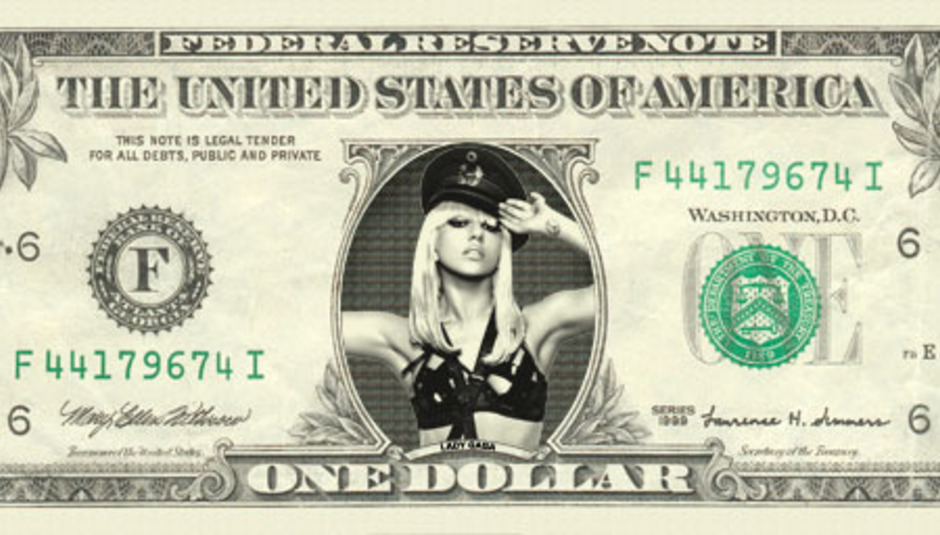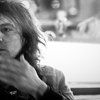Howdy. Here lies the latest DiS Does Pop column in which we delve into the murky world of the Top 40 via a hefty dose of derogatory comments aimed at David Guetta.
This month we’ll be cracking open the old ‘sell out’ chestnut to find, well frankly, a lot of super-rich musicians at its sickly sweet core. Read on to discover how much money there is to be reaped from over-zealous corporate sponsorship deals, who is pop music’s worst offender and whether we should be that bothered about the whole shebang.
There’s also the usual Top 40 Watch and a classic Made For TV moment for your viewing pleasure.
In search of pop’s biggest sell out?
The term ‘sell out’ is as old as mankind’s ability to think, 'fuck my credibility, I’d prefer a ridiculously large lump sum of cash'. Chances are if you’re talented enough to string three chords together, you’ll have been levelled with this notoriously vague charge at some point or another.
In the world of indie, a band is usually accused of selling out if they are seen to compromise their art for financial gain. For pop artists however, the amount of corporate dollar they can attract forms a large part of their perceived value. Selling out is an active career goal rather than a reluctant means of funding the next album.
This means that some starlets are better and more willing to milk their fanbase than others. Time to single out the worst offenders.
“Start saving your pennies now. People spend $300 (£190) on crazy things all the time, things like handbags. So work all year, scrape the money together and come to my show. I'm worth it.'' - Madonna (Newsweek Magazine)
Yes, that’s Madonna trying to justify why her fans should spend an obscene amount of money on a ticket to attend her forthcoming arena tour. As you’d imagine, Madge isn’t exactly skint either. The material girl grossed $408 million US dollars from her last Sticky & Sweet jaunt, making it the highest grossing solo tour of all time.
While it's easy to begrudge anyone who charges such an obscene amount of money for their fans to watch them live, there’s an argument to say, ‘well... fair enough’. Just as Adele refused to place her album on Spotify and reaped global record sales of over 17 million for 21, fans had the choice of not shelling out and they unanimously decided against it.
A better example of someone who rinses her fans for all they’re worth from her record sales would be Katy Perry. Technically the California Gurl’s Teenage Dream is on a par with Michael Jackson’s Thriller for producing a stunning five Billboard Hot 100 topping singles from the same album. In reality, she achieved such strong showings for ‘E.T.’and ‘Last Friday Night (T.G.I.F.)’ by releasing each track in its original incarnation, then releasing a new remix version with a guest rapper verse tacked on. So desperate was Perry to grab six straight Number 1s on the trot with ‘The One That Got Away’, that she unleashed three separate incarnations of the song all to no avail.
If you thought the Teenage Dream story had finally reached some sort of (undignified) conclusion however, you’d be very wrong. Despite having shifted 5.5 million copies globally, or because of this staggering figure, the entire LP’s over-inflated corpse is being revived one final time for a deluxe Complete Confection release. Naturally this features a smattering of three new tracks, including the painfully dull ‘Part Of Me’, plus one megamix but the rest of it is comprised of songs ardent Perry fans will already own in one form or another.
To place this naked manoeuvring for a quick buck in context, when Lady Gaga came to release a special edition of The Fame, she tacked on the phenomenal Fame Monster album. This was also issued in a single CD edition so no one had to pay twice to hear the new material.
Opportunism comes in many different shades though and Stefani Germanotta is by no means immune to the allure of advertising money. Anyone remember that ‘Telephone’ video?
“I swear to you... The Coke cans, the Wonder Bread, I could name like five things from that video [out of eleven] that I was not paid to put in.” - Lady Gaga (NME Magazine)
Heartbeats earphones, Virgin Mobile, Chevrolet, Polaroid, Miracle Whip, Nemiroff vodka, Burberry, Nintendo, Carerra sunglasses, HP and Chanel. These are just a selection of the brands that have featured across Gaga’s past promo videos. These endorsements, alongside her album sales and takings from the $227.4 million grossing Monster Ball tour, earned the ‘Marry The Night’ hitmaker over $90 million for the year ending May 2011.
Speaking on the ‘Telephone’ debacle Lady Gaga has commented, "I don't regret it. I didn't have the money, I won't do it again.” This plea of poverty is the same used to justify most inclusions of product placement in music videos.
Miraculously, Lady Gaga has kept to her word and continued to make overlong promos without the mass product placement of yore. As for Pixie Lott, there's no doubt she could have made the video for ‘What Do You Take Me For?’ without having to thank her "friends at Citroën" afterwards. How expensive can a wardrobe of impossibly short skirts be?
For popstars, cramming an array of consumer products into your videos is the new ‘having your song featured in an advertisement’. While worldwide licensing revenues from synchronization (i.e. lending music to an advert) is at an all-time high of $2.5 billion, according to figures from Heartbeats International, you won’t see many chart toppers attached to adverts. Advertising agencies prefer to use lesser known tracks or obscure covers of popular tracks, it’s much cheaper.
Don’t feel too sorry for the poor souls, they more than make up for the loss by bravely putting themselves as brand ambassadors to an impressive number of products. These sponsorship agreements aren't engineered by the artists themselves, they’re actively sought out by their labels. In the era of the 360 record deal where almost every activity you undertake as an artist falls under contract, Universal hold an entire team of staff geared towards such partnerships and a website dedicated to boasting about their achievements.
So how obliged are popstars to cash in their chips and sell out? Well, that depends on the twin pillars of branding and status. Marketing is a two way street and an act has to fit with the image of a company before they can invest. Chris Brown may have managed to recapture the charts but since he’s barred from entering the UK due to his history of domestic violence, you won't spot him sampling some Yeo Valley in the X Factor ad break. Likewise, Madonna doesn’t have to say yes to anything because, well... she’s Madonna.
If you’re squeaky clean and not bothered about notions of credibility or the ethics of draining every last dollar from your teenage fanbase however, there is a ludicrous amount of dollar to be made. In other words, Justin Bieber is absolutely rolling in it.
Pop’s worst ‘sell out’ by quite some distance takes the crown for an outstanding performance in every arena mentioned so far. Where Katy Perry is content with re-releasing a deluxe version of Teenage Dream, Justin Bieber released his debut My World in two halves and then collated them together for My Worlds -The Collection. Where Pixie Lott is content with draping herself over a brand new Citroën in her music videos, Justin Bieber even segues product placement into his arena tour entrance video. Where Lady Gaga creates her own social network for fans to interact in, Justin Bieber charges $99 per year for you to use his official forum.
Having signed merchandising deals with everyone from Beats by Dr. Dre to Clare’s Accessories, the 18 year-old Canadian was the world’s third most powerful celebrity in 2011, according to Forbes. In total he amassed $53 million from these cynical undertakings and many, many more.
While the term ‘sell out’ remains completely subjective, exploitation is much easier to spot. Asking fans to pay for almost exactly the same thing twice. Using your music as a vehicle for a barrage of product placement. Slapping your name on a perfume just because you can and people will pay for it.
If 'choice' is the operative word in the sell out equation, then these actions transform pop fandom into an obligation rather than an innocent thrill. There’s a fine balance between striking while the iron’s hot and branding your followers like cattle. At the bottom line, some artists hold enough savvy to have their cake and eat it. Others are too busy stuffing their faces to notice the difference.
Top 40 Watch
Somebody That I Used To Know (feat. Kimbra) - Gotye
Let’s be very clear about this readers, there are some revivals which will be tolerated. The whole 80s synth-pop thing may have dragged on a bit but at least, we got Ladyhawke, La Roux and a short-lived Preston solo career out of it. The lad rock uprising was never short of a laugh at The Enemy’s expense.
A serious resurgence in the MOR sounds of Sting, Phil Collins and Toto however, must never be allowed to happen. Years on from now a generation will question, ‘Who scored the most UK Number 1 singles in February 2012?’ We will reply in unison, ‘No one. Eat up those Honey Nut Space Loops and mind your own business.’
21 - Adele
Adele has sold an album every seven seconds since last year’s BRIT Awards. This is the 21st non-consecutive week 21 has spent on top of the UK album charts. These are the kind of statistics that stand well beyond the rhyme or reason of one particularly teary rendition of ‘Someone Like You’ 12 months ago.
Having grabbed enough Grammys to sink a battleship earlier in the month, this Tottenham-born chanteuse is now indelibly marked in the bestseller cannon alongside Meat Loaf, Alanis Morissette and Céline Dion. Illustrious company we’re sure you’ll agree?
Emeli Sandé - Our Version Of Events
With a Critics Choice Brit Award to her almighty quiff, a debut week at Number 1 on the album charts was near enough guaranteed for Emeli Sandé. Despite having achieved first week sales of over 113,000 copies, we imagine a few EMI execs will still be smarting after Professor Green's backing singer lost out to Adele only seven days later.
For what it’s worth, the album is an ideal buy for Mother’s Day if your Mum is a Radio 2 listener or there’s nothing else available from your local Tesco Metro.
Nicki Minaj - Starships
For all Nicki Minaj’s tongue-scrambling wordplay, the schizophrenic rapper remains at her best when she’s repeating the same syllables over and over again and ramming home an effortlessly memorable chorus line. Opening with the line "Let’s go to the beach each lets a go away" it is quite obvious, The UK's Number 7 single is another cracker from RedOne. "Higher than a motherfucker" is the new "Boom, badoom, boom, boom, badoom, boom bass".
Whitney Houston - The Essential
Following on from her untimely passing, two Whitney 'Best Of' packages, The Essential and The Greatest Hits, have rolled into the album charts. Add Amy Winehouse’s Lioness into the mix and that’s three posthumous selections which the public have all bought in tribute to a tragic loss of talent. A sad reminder of those who have wilted under the intense spotlight of celebrity.
Made For TV
It’s almost unfathomable how anyone thought ‘Elephant’ was a single worthy of the four million-selling Alexandra Burke. Nevertheless, here the former X Factor winner is on primetime Saturday night TV, singing with a voice that never needed auto-tuning yet has some how been stripped of all human emotion. Like a cyborg wailing through a wind tunnel.
To give the BBC audience credit, they clap along deliriously in four-four time until confronted with that “Elephant in the room” chorus. Do they keep clapping? Do they stop clapping? Do they clap a little bit and then give up out of embarrassment? No one has the answer, not least Alexandra Burke.






















